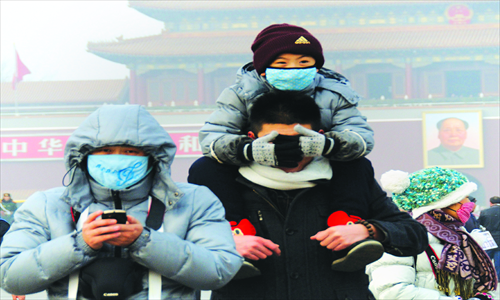Beijing cough: hacking and gasping through another winter

It wasn't long after Kristen Miracle arrived in Beijing when she began to feel discomfort.
"I arrived in Beijing on December 29, 2011. About four weeks later, I started to not feel well. I had a little bit of a cough, a little bit of trouble breathing whenever I was rushing. I had to catch my breath," said the 24-year-old teacher at Beanstalk International Kindergarten in Chaoyang district.
She went to the doctor when she had a fever and discovered she had a chest infection. Even after the chest infection cleared up, the congestion in her lungs has lingered.
"Every now and then, I will cough stuff up," she said. "I never had that until I lived in Beijing."
The phenomenon, known in the expat community as the "Beijing cough," has struck many people like Miracle. Even though it's not an official, medically-recognized ailment, the victims of "Beijing cough" say their symptoms are connected to the bad air quality in Beijing.
Miracle understands it as a chronic kind of low, deep cough and noticed from her teaching experience that lots of children living here have to clear their throats frequently.
While still in the US, preparing for her move to Beijing, Miracle joined a Yahoo forum where people were talking about Beijing's poor air quality, but she wasn't aware of the severity of the problem until she started seeing air quality index (AQI) numbers from the US Embassy and discussions about where to buy masks in Beijing.
Because of Miracle's allergies, she's sensitive to any air activity. After getting sick, she grew more concerned and began to take extra precautions, such as checking the AQI data daily and wearing a mask on polluted days.
The cough can happen to Chinese as well. For people who come to Beijing from other provinces, the air can pose a health hazard, but the phrase "Beijing cough" isn't as popular or widespread among them.
Su Sujie, a 25-year-old petroleum engineer from South China's Guangdong Province, developed a dry, phlegm-less cough when he came to Beijing in 2008 to attend college.
"At that time, I thought it was a regular cough. Starting from the end of autumn, beginning of winter, I started coughing as soon as I got up in the morning and my throat itched," he said.
The symptoms only stopped when he went home during winter and summer breaks. He had no idea his cough was connected to air quality in Beijing and didn't take any precautionary measures.
"The most I did was cooking soups that had beneficial effects for my lungs, such as pear and pig lung soup," he said.
Su has only recently learned about "Beijing cough" from the media. After living through the heavy pollution in the past few days, he decided to buy a mask and reduce outdoor activities, saying one's health is everything.
"I went out to eat last Saturday and the fog looked yellow. It was terrible," he said. "You can make all this money, but what if you can't live to spend the money?"
Pan Xiaochuan, a professor of public heath at Peking University, has heard of the "Beijing cough," but said it's a phenomenon named by expats and doesn't have any official standing in the medical community yet.
But the danger of PM2.5 pollution (particulate matter less than 2.5 microns) is widely acknowledged. A study conducted by Peking University and environmental NGO Greenpeace published last month says air pollution led to 2,349 deaths in Beijing in 2010, and the authors, Pan included, expect deaths in 2012 to reach 2,589.
Greenpeace has also published tips on their official website, urging people to protect themselves from the dangers of PM2.5.
"Senior citizens, children, pregnant women and crowds with respiratory diseases should avoid staying outside for a long time when the PM2.5 value reaches 75-115 micrograms per cubic meter. And regular adults should wear masks when the PM2.5 value reaches 150-250 micrograms per cubic meter," the report said.
Regular reports of air quality usually come measured in AQI, not PM2.5 values. At-risk populations should stay indoors for AQI values of 101 to 150, and the entire population should use precautions at levels of 201 to 300. Recent AQI readings from the top sources for AQI data, the US Embassy and the Beijing Environmental Monitoring Center, have been 500 or above.
Learning Chinese: Chinese Wire -- 北京咳